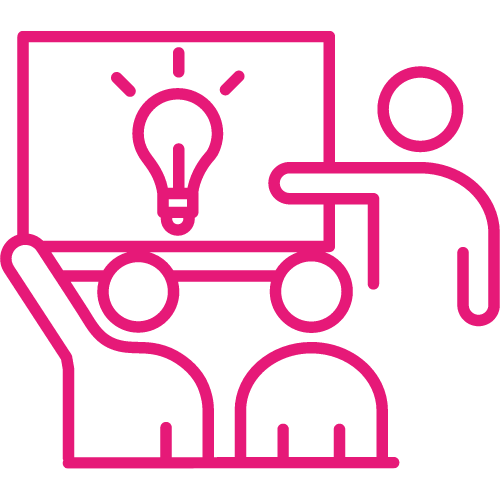Being an educator can be a stressful job, shaping the lives of learners is no easy feat! However, it is important that you know how to switch off and take a break for the benefit of your mental health and wellbeing.
This blog discusses stress in the education sector and our top strategies to support teachers’ mental health and wellbeing.
Stress in the Education Sector: What the statistics say
Everyone experiences stress in their day-to-day lives; from low-level stress that can be good for our motivation to high levels of stress that can negatively affect our mental health and well-being.
The National Education Union Cymru, in their state of education survey, found a worrying rise in the number of teachers intending to leave the profession. 52% of teachers say their workload is either “unmanagable” or “unmanagable most of the time” and two-thirds of teachers feel stressed at least 60% of the time.
Likewise, Education Support, a charity that gives mental health help to education professionals, published these findings in their annual Teacher Wellbeing Index. The index provides insight into the mental health and wellbeing of teaching professionals working across the UK. 3000 teachers were surveyed in 2021 and the results showed that 72% of teaching professionals describe themselves as stressed, with 84% of senior leaders also experiencing high levels of stress.
All this paints a worrying picture that educators are experiencing high levels of stress at work. However, there are steps that can be taken to become more mindful of stress, allowing you to develop strategies to combat workplace stress.
5 Top Tips to Support Teachers Mental Health
While everyone manages their mental health and wellbeing differently, we have a list of our top five strategies to use when you are feeling overwhelmed and need to take a break.
1. Leave work at work

Everyone is guilty of at some point bringing their work home with them. Sometimes with large workloads, it becomes normal to mark papers at home or read reports. However, it is important you have designated “work” areas, so that when you are finished, and it is time for you to wind down, you can leave your work area and focus on yourself.
If you work from home try to have an “office” type space where you work and don’t use for every day at-home activities. Separating your working areas, from personal areas of your home, is a good example of promoting a healthy separation of work and your personal life.
2. Get some fresh air

Taking a break from work can be so productive for our mental health and wellbeing as well as for our work. In 2020 Ned Friedman, Director of The Arnold Arboretum, collaborated with Joseph G, Allen and Marc Lipsitch at Harvard School of Public Health, to write an article for The Washington Post, on the importance of fresh air and the impact it can have on a person’s mental health and wellbeing.
Try to go for a daily walk or do some other form of exercise that you enjoy. Don’t try to go to the gym if the gym is not your thing. Focusing yourself to do an activity you do not want to do will not help your productivity. Instead, focus on an activity you enjoy like walking the dog, going swimming, doing a yoga class, or meeting friends at the park for a coffee. Anything that gets you out of the house will help you to manage your stress.
3. Prioritise your responsibilities

There are only so many hours in a day so to better manage your workload make sure you prioritise the important tasks that need to be done first. Try a simple exercise where you grab three sheets of paper, then fill in tasks that need to be done today, tasks that need to be done this week and tasks that can wait.
This will help you manage your workload and reach out for help if you have too much on your plate. Digital organisational systems such as Asana are great for personal and work organisations.
4. Stay hydrated

One of the simplest things we can do to manage our mental health and wellbeing is to ensure we are not dehydrated. The British Nutrition Foundation states that hydration is vital as “if we are dehydrated this can make us feel tired, cause headaches and make it difficult to concentrate.”
There are many benefits to being hydrated that include:
- Fewer headaches
- Better quality of sleep
- Better mood
- More energy
- More ability to focus on what you are working on
If you struggle to drink plain water you can try to flavour it with lemon or cucumber. If you struggle remembering to drink water you can get apps that set regular alarms to remind you to hydrate or drink bottles that have times down the side so when you look at it you are encouraged to drink.
5. Practice mindfulness

Mindfulness can become your superpower if used correctly. Practicing mindfulness will allow you to understand the signs that you are starting to experience stress in a negative manner.
Check in with yourself to see how you are doing, if you have taken a break recently and if there is anything you can do to help your mental health and wellbeing. Other forms of mindfulness can include things like breathing techniques and meditation to help you relax. The Yoga World found that in the UK 26% of adults meditate to improve their mental wellbeing.
Mindfulness can also be as simple as connecting with a friend or professional to take about how you are currently feeling.
These tips are perfect to put into place to ensure you take a proactive approach to your mental health and wellbeing and learn to identify when you are getting overworked or over-whelmed, rather than react when you are too stressed.
Contact Equal Education Partners
Remember our team at Equal are here to support you in your role as best we can. Whether you are looking for a new role, professional development opportunities, or just need some support we are always here to help.
Get in touch with our friendly team today!




